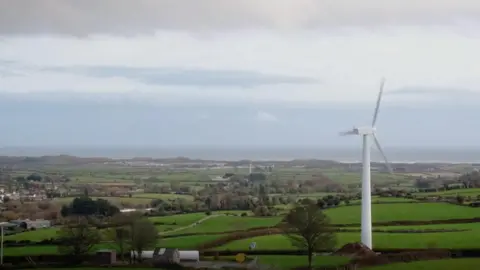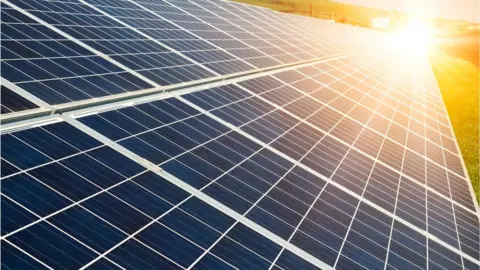Stormont energy plan 'will create jobs and lower bills'
 BBC
BBCNorthern Ireland's first energy strategy action plan has been published by the Department for the Economy.
It outlines 22 actions for 2022, as the first step to reduce energy-related emissions by 56% by 2030.
Economy Minister Gordon Lyons said it will create jobs and lead to lower costs for consumers.
About a third of the actions outlined in the plan aim to replace fossil fuels with renewable energy.
"We will take an energy efficiency-first approach which will help consumers reduce the energy they use and therefore minimise their energy bills," Mr Lyons said.
"The action plan maps out the best route to ensuring people will live and work in more energy efficient buildings, whilst helping some of the most vulnerable in society to live in warmer homes, reduce ill health and ultimately save lives."
Energy - in the form of power, heating and transport - accounts for almost 60% of Northern Ireland's greenhouse gas emissions.
The actions outlined in the plans range from a geothermal project and studying the future role of biomethane, to low carbon heat technologies for homes and businesses.
And there are detailed plans around the creation of a one-stop shop for consumers, where they can get advice and guidance on support to become more energy efficient and help reduce emissions.
There is also a new £10m Green Innovation Challenge Fund which will be launched in April.

Analysis: Potential for change but stumbling blocks ahead
Northern Ireland's energy strategy promised publication of an action plan early in the new year, and it's delivered 22 actions for 2022.
If all, or even most, of those actions are achieved over the coming 12 months, the power picture in Northern Ireland will be starting to look different by this time next year.
But there are some potential stumbling blocks along the way - first and foremost of course, is money.
While the innovation fund, we're told, is ready to start from the beginning of the next tax year, other ideas will cost money.
And the finance minister has already prioritised health.
There is also the court of public opinion that will judge these actions - there is already opposition to gas storage, but hydrogen will need to be stored somehow, somewhere, when it's being produced in quantity.
Overall, the actions outlined in the plan show the urgency of the work required over the next crucial decade, if Northern Ireland is to make any kind of dent in reducing its emissions by 2030.

While the energy plan is being produced by the Department for the Economy, officials say almost every executive department will have a part to play.
Those roles include the Department for Communities in addressing fuel poverty, Infrastructure in supporting the expansion of the electric vehicle network and Department of Finance in providing the money.
Meanwhile, NIE Networks has announced it will be creating at least 110 jobs, as part of a £50m investment in the electricity network.
Recruitment has already started for some of the new posts, which include apprenticeships and graduate jobs as well.
The additional funding was approved by the Utility Regulator, and will be focused on green energy over the next three years.
That will cover the roll-out of new infrastructure to support customers who are moving to low-carbon technologies, like heat pumps for domestic heating and electric vehicles.
 Getty Images/DiyanaDimitrova
Getty Images/DiyanaDimitrovaPaul Stapleton, managing director of NIE Networks, said the investment was in line with the aims of the energy strategy.
A target of generating 70% of power from renewable sources has been set for 2030.
Almost half of Northern Ireland's electricity is already generated from renewable sources, mainly wind.
"We need to do more of that," said Mr Stapleton.
"We also need more solar but there's also newer solutions emerging, such as geothermal, tidal, off-shore wind. Hydrogen will have a role to play.
"And all of those technologies will be interdependent in some way with the electricity network, so we have a critical role to play to ensure all of those solutions can come together to form an integrated, sustainable energy system."
